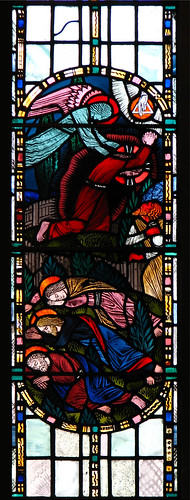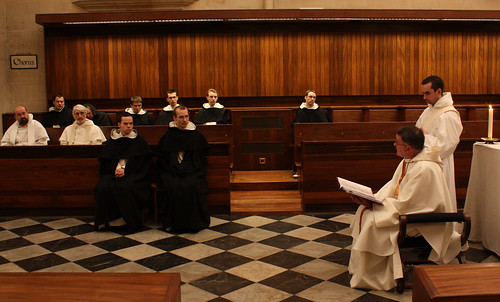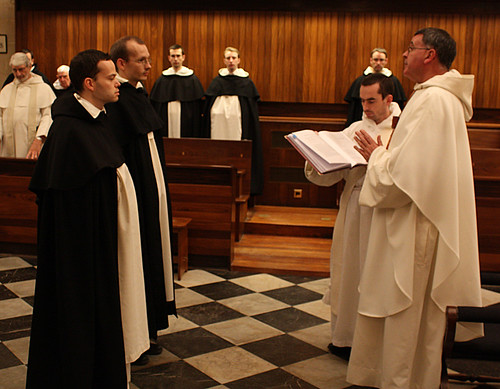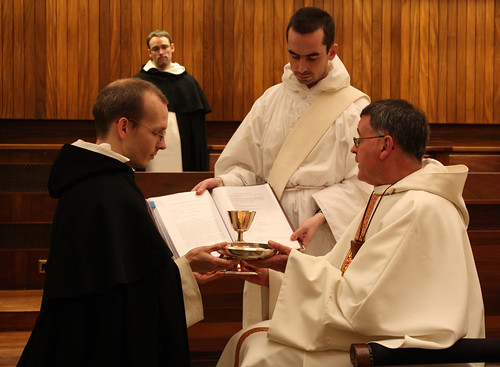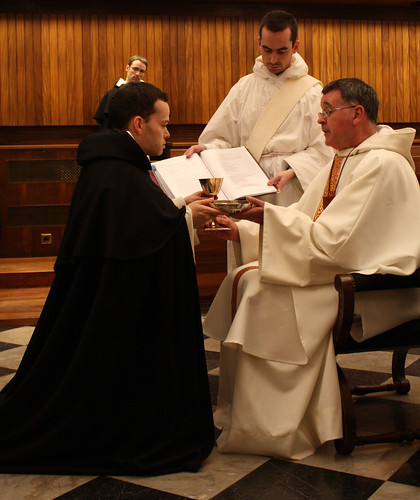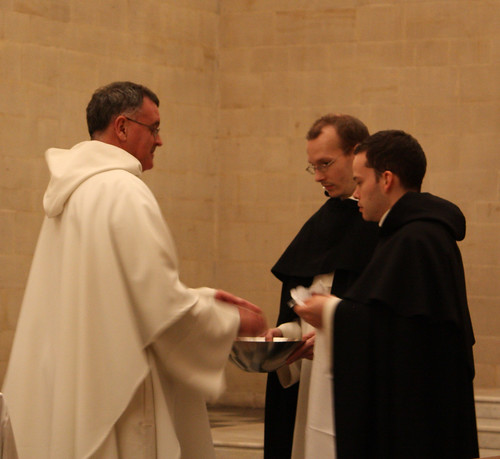Sunday, November 30, 2008
Alma Redemptoris Mater
Alma Redemptoris Mater, quae pervia caeli
Porta manes, et stella maris, succurre cadenti,
Surgere qui curat, populo: tu quae genuisti,
Natura mirante, tuum sanctum Genitorem
Virgo prius ac posterius, Gabrielis ab ore
Sumens illud Ave, peccatorum miserere.
"Kindly Mother of the Redeemer, who art ever of heaven
The open gate, and the star of the sea, aid a fallen people,
Which is trying to rise again; thou who didst give birth,
While Nature marvelled how, to thy Holy Creator,
Virgin both before and after, from Gabriel's mouth
Accepting the All hail, be merciful towards sinners."
(translated by Cardinal Newman)
Saturday, November 29, 2008
First Sunday of Advent - Waiting and Hoping
And, of course, the disciples fail. They fall asleep, and soon will fall away. They are not alert to God working in and through Jesus: at the Cross, it is the pagan centurion who affirms that Jesus ‘Truly was God’s Son’; and even after the Resurrection the women who witness the empty tomb ‘said nothing, because they were afraid’.
Like the first disciples, we, too, fail. Our disordered appetites leave us being tossed about in every wind like Isaiah’s dry leaves, and our shame at our failure to live up to the commitments we’ve assumed as disciples leaves us cowering in filthy clothing before the all-Holy God. Yet, Isaiah finishes by making the audacious claim that the people of Israel, and, by extension, ourselves, are God’s responsibility, His treasured possession, the work of His hands.
This is so, St Paul reminds us, because God has called us, poured out the gifts of His Spirit upon us, and joined us to his Son. God’s face does shine on us, if we will only recognise that, turn back to him, and seek forgiveness. Every year this season is given to us to renew our sense of what really is important, and to seek God’s gift of forgiveness, sacramentally or otherwise.
Visit our newly relaunched websites!
 On the first Sunday of Advent, as the Church begins a new liturgical year, the English Dominican Province is happy to announce the relaunch of two of our websites:
On the first Sunday of Advent, as the Church begins a new liturgical year, the English Dominican Province is happy to announce the relaunch of two of our websites:Friday, November 28, 2008
Thanksgiving at Blackfriars
 Each year, the community of Blackfriars in Oxford celebrates Thanksgiving with students of the Hall and Studium many of whom are American.
Each year, the community of Blackfriars in Oxford celebrates Thanksgiving with students of the Hall and Studium many of whom are American. Thanksgiving is a time for family and reunions, and it was wonderful to see two of our former Hall students from last year who chose to spend the holiday with us.
Thanksgiving is a time for family and reunions, and it was wonderful to see two of our former Hall students from last year who chose to spend the holiday with us. Above, fr David Sanders OP, who is Dean of the Hall, celebrates with one of our new students. Thanksgiving is a chance for us to celebrate together and to give thanks to God for His providential care.
Above, fr David Sanders OP, who is Dean of the Hall, celebrates with one of our new students. Thanksgiving is a chance for us to celebrate together and to give thanks to God for His providential care. fr Gregory Murphy OP carves one of the four turkeys, and the tables are laden with dishes prepared by the students.
fr Gregory Murphy OP carves one of the four turkeys, and the tables are laden with dishes prepared by the students. "Every joy and suffering, every event and need can become the matter for thanksgiving which, sharing in that of Christ, should fill one's whole life: 'Give thanks in all circumstances' (1 Thess 5:18)" - Catechism of the Catholic Church §2648.
"Every joy and suffering, every event and need can become the matter for thanksgiving which, sharing in that of Christ, should fill one's whole life: 'Give thanks in all circumstances' (1 Thess 5:18)" - Catechism of the Catholic Church §2648.
Tuesday, November 25, 2008
Remembering... fr John Martin McGowan OP (1949-2008)
 Godzdogz readers may recall an announcement on this blog about the sudden death of fr John Martin McGowan OP on 16 June 2008. fr John Martin was born on 11 May 1949 together with his twin brother, George, who was born shortly after him and who survives him. They grew up in Wishaw, north Lanarkshire, and before entering the Order, John Martin trained as a plumber.
Godzdogz readers may recall an announcement on this blog about the sudden death of fr John Martin McGowan OP on 16 June 2008. fr John Martin was born on 11 May 1949 together with his twin brother, George, who was born shortly after him and who survives him. They grew up in Wishaw, north Lanarkshire, and before entering the Order, John Martin trained as a plumber.Monday, November 24, 2008
Institution of Acolytes
The provincial addresses the brothers who are to become acolytes, reminding them that their closeness to the altar is to be marked by a growth in charity: "In performing your ministry, bear in mind that as you share one bread with your brothers and sisters, so you form one body with them. Show a sincere love for Christ’s Mystical Body, God’s holy people, and especially for the weak and the sick…"
As the paten with bread and chalice with wine is handed over to the acolytes as a sign of their ministry, the provincial says: "Take this vessel... for the celebration of the Eucharist. Make your life worthy of your service at the table of the Lord and of his Church."
The Martyrs of Vietnam
 Today we remember the Dominican Martyrs of Vietnam. Many of them were European missionaries supported by the King of Spain. The Spanish monarch exhorted missionaries to proclaim the faith and cultivate home-grown vocations in the territory. Scholarships were provided for Vietnamese men to study in Juan De Letran College in Manila. One friar to follow this path was Saint Vincent Liem Le Duang.
Today we remember the Dominican Martyrs of Vietnam. Many of them were European missionaries supported by the King of Spain. The Spanish monarch exhorted missionaries to proclaim the faith and cultivate home-grown vocations in the territory. Scholarships were provided for Vietnamese men to study in Juan De Letran College in Manila. One friar to follow this path was Saint Vincent Liem Le Duang.He was born into the Christian community of Thong-Dong in 1731. From a young age he showed great devotion and ability. He was sent to the Philippines at the age of fifteen and took the habit in 1753. After completing his studies at the University of St. Thomas, he was ordained priest and returned to his native land. As he could speak Vietnamese he started his apostolate immediately. He spent the next fourteen years ministering to Christian communities, teaching at the seminary of Trung-Linh and preaching in the non-Christian areas.
From 1767 the Church in Vietnam came under attack from the authorities. Vincent nevertheless continued to proclaim the Gospel openly, regardless of the obstacles and threats. He was captured in 1773, beaten and imprisoned. He was placed in a cage and displayed like a wild animal. However the local Mandarin believed that this ritual humiliation would not help the authorities’ attempt to crush the Christian religion. Vincent was released from his cage and allowed to walk about the prison. He took advantage of his relative liberty and preached the Gospel to his fellow prisoners and all who would come to listen. This status was short lived and he was put back in his cage and taken to Hanoi and the Imperial Court.
At the Court the Emperor arranged a disputation between Vincent, a Buddhist, a Confucian and a Taoist. His reasoning, clarity and elegance, in defending the true faith, left a deep impressio, so much so that an Imperial Prince declared the superiority of Christianity. However Vincent’s fate was decided after a stormy dialogue with the Queen Mother. He was sentenced to death and was beheaded on the 7th of November 1773.
The persecutions of the Vietnamese Church would continue. In 1975 the exodus of Vietnamese friars would result in the formation of a new vicariate outside their motherland: the Vicariate of St Vincent Liem. Every day, the brothers of the vicariate, pray for the conversion of Vietnam, through the intercession of St. Vincent. Let us join them today in that prayer -
Thursday, November 20, 2008
A Life Poured Out

November is a time for remembering the dead, and on 18th November, Blackfriars was privileged to host a special talk commemorating the life, vision and eventual martyrdom of the Dominican bishop of Oran in Algeria, Pierre Claverie. Bishop Claverie was confident that dialogue through friendship was essential for a Christian living with Muslims in Algeria, and his assassination in 1996 showed the depth of his love. On 1st August of that year, Bishop Claverie was assassinated by the 'Islamic Salvation Front' in a booby trap explosion at the entrance to his house. His young Algerian driver, Mohammed Bouchikhi, died with him and the mingling of their blood was seen by many as a symbol of the bishop's desire to find a home in the hearts of the Algerian people and to participate in their sufferings.
The talk was given by fr Jean-Jacques Pérennès OP, who is the General Secretary of the Dominican Institute for Oriential Studies in Cairo, to a full hall of Dominican friars, sisters and laity, as well as students and friends of Blackfriars, and Muslim scholars. fr Jean-Jacques, who was Bishop Claverie's friend and fellow friar, has spent years editing the enormous body of correspondence generated by Claverie - he wrote a letter a week to his parents for four decades. The result is a fascinating biography, now available in English, called 'A Life Poured Out'.
As John L. Allen has written: "A perennial temptation with saints, whether of the formally canonized variety or not, is to reduce their lives to bumper stickers." However, as fr Jean-Jacques emphasised, the issues are too complex and the writings of Bishop Claverie too subtle and nuanced to be simplified in this way. In a classically Dominican way, friendship stood at the core of Claverie's thinking and is the basis for dialogue, which will include disagreements and persuasion. Allen continues: "In a time when discussion of Christian/Muslim relations is dominated by ideology and abstract theological debate, Claverie represents an utterly different path: a life lived as a 'guest in the house of Islam', not blind to the challenges and never fuzzy about his Christian identity, but relentless in his commitment to friendship. Claverie's interest was what he called the 'real, living Islam', meaning people rather than theories."

fr Jean-Jacques also commented on Claverie's approach which gave priority to friendship. He said: "If you start with formal theological exchanges, you come very quickly to big, difficult problems. We will argue about the Trinity and other matters, which requires a lot of skills, reflection, and preparation to deal with it well. But if you start at the human level, it's different. Often Claverie would say, 'We don't have the words for dialogue yet.' So, let's start first by living together, addressing together common challenges. This is what he tried to do, to build what he called 'platforms of encounter,' meaning places where people can work together on human rights, women's issues, and so on. Then you feel that you are all human beings, you come closer to each other." fr Claverie's approach to dialogue is ever more needful today in a world where fear of the other robs all of us of our common humanity. Such dialogue also has deep roots in the example of St Thomas Aquinas who did not hesitate to listen to others (whether pagan Greek, Jew or Muslim) to draw from their wisdom, and to befriend them for the sake of the Gospel.
fr Pierre Claverie's commitment to dialogue, and to his friends in Algeria, was such that even when it became clear that his life was in danger he refused to leave. Many years earlier, as people fled Algiers, he found himself one of the few who had chosen to enter, and so he chose to stay and be with those whom he loved. His example, which has inspired Christians and Muslims alike, was deeply moving, and I felt humbled and privileged to be a brother in St Dominic to someone like him, and to the many other Dominicans who still suffer for their faith.

Wednesday, November 19, 2008
Quodlibet 13 - Salvation and Hell
 Question
QuestionIf the saved know that some of their loved ones are damned how is it that they can have perfect happiness? How is it that they could not lament the loss of souls? How, indeed, could God not lament their loss?
Answer
God is the Answer, and in Heaven we will know God as He is (see John 17:3, I John 3:2, St. Thomas Aquinas, Summa Theologiae I 12, 1) – but since, even then, we will not be able to fathom Him completely (Summa Theologiae I 12,7), I wonder to what extent we will, even then, understand how absolutely everything fits together under God’s providence.
“God wills all people to be saved (I Timothy 2:4).” Now, If God wills something, in the most absolute and unqualified sense, then what He wills, comes to pass (Summa Theologiae I 19, 6; 19,8). If God wills Fred to be saved then Fred will infallibly be saved. Not because God will over-ride Fred’s will, but because God will create in Fred a good will, such that Fred loves God freely; He will draw Fred to Him in such a way that Fred journeys into Him voluntarily.
According to many Gospel passages, it is at least possible that some human beings are not saved; it seems certain that the fallen angels are not saved (See Matthew 25:41 and Revelation 20:10). Therefore it seems that God does not, in the absolute and unqualified sense, will all His rational creatures to be saved. We must take “God wills all people to be saved” in a less absolute sense. In the present case, we can say that God provides superabundantly for the salvation of all, through Jesus’ Passion, Death and Resurrection, and through planting in all people at least an implicit thirst for Him, one they can honour or resist. The basic shape of God’s plan is a plan for salvation; He has no plan of damnation – that is, it never happens that He creates, say, Joe with the intention of sending Joe to hell. But it can happen that God permits Joe to reject Him, and to die refusing to journey into God. Then, Joe gets eternity without God.
If we say, “Of course, God gets everyone to heaven” we run the risk of effectively obliging God to do this, and salvation ceases to be a gift; and we run the risk of making our decisions and actions eternally irrelevant. We cannot rule out the possibility of hell but we are obliged to hope for heaven (Summa Theologiae II.II 20,1; 20,3; 22,1) building our lives on the energising conviction that God who has begun a good work in us will securely bring it to completion.
By charity, we are obliged to thirst, pray and work for the eternal salvation of all people. When we get to heaven we will delight in a special way in the glory of the greatest Saints, but also in a special way in the glory of those who have shared our journey (Summa Theologiae II.II 26.13). We are obliged to pray, “Thy will be done,” but we are not in fact obliged to want the damnation of any whom God permits to go to hell! While they live, we are obliged to be concerned for the salvation of all, even if it turns out that some we try to save, will not be saved.

At the Last Judgement, the attitude of each to God is revealed on the public stage, and the mysteries of God’s grace and providence are revealed for praise and thanksgiving. Presumably this means that we see, to some extent at least, why God has permitted the evils He has, and how He has brought good out of them. Will we give praise and thanksgiving for the damnation of those (if any) who are lost? I suspect not. To some extent, we have to praise God for His judgements (Revelation 16:5-7, 18:20, 19:1-3). But we don’t have to picture God positively punishing the damned, nor do we have to picture the saved watching the torment of the damned. Julian of Norwich says there is no mention of satan or of the lost before God and His elect (Revelations of Divine Love, long text, chapter 33) – the vision of God, and the common rejoicing of those who have journeyed together into Him, is more-than-sufficient delight. Further, if the lost have rejected life with God, they have opted for next-to-nothingness and for insignificance (for it is only in God we find our meaning). The pictures of lakes of sulphur and the like are not so much pictures of a positive retribution as of the stupidity of choosing life without God.
Although the image of God’s grief is in Scripture (Isaiah 63:10, Ephesians 4:30) we know that He is beyond emotion so that we can’t say He is literally “hurt” by anyone’s loss. But how His delight in being and goodness is compatible with permitting anyone’s loss is a mystery. We will give eternal thanks for His justice (the wisdom and beauty of His ways) and for His mercy (His steadfast, saving love, which “goes before and beyond” justice [Summa Theologiae I 21,4]). We will rejoice in the glory He wills to give us, and the way He has brought us to it, without envy of those whose glory is greater, and without any sadness due to its limitations (Augustine, City of God, Book XXII, ch. 30; Summa Theologiae II.II 26,13; Dante, Paradiso, Canto 3). I will not be sad because I never had any brothers or sisters with whom to share the journey to heaven. If I notice the absence of some cousin with whom I have shared the journey, and for whose salvation I have prayed, it is hard to see how that could increase my joy – but presumably I will see, in God, how it should not spoil my joy.

I end by pointing out with Julian of Norwich (Revelations of Divine Love, long text, chapters 11 and 32) that we expect the Holy Trinity to do something on the Last Day that will ensure that all manner of thing shall be well, and will show how, since all that is done, is done by God, all is well done. Which does not mean God does evil, since, as Julian explains, following Augustine and Aquinas, evil has no being in itself, but is the absence of a good that should be there.
Richard Conrad, O.P.
Tuesday, November 11, 2008
Quodlibet 12 - How much do Dominicans study?
 People who know only a few things about the Dominicans are likely to know that the Order places greater importance on study than almost anything else, besides the vocation to preach. In the English Province, most students will study for a minimum of five years before ordination to the priesthood, and many will study for higher degrees after ordination, either immediately or following a few years of pastoral and preaching experience. However, for the Dominican, being engaged in theological study at some level is a life-long occupation, and does not merely end with formal studies during preparation for the priesthood. It is important that all Dominicans have a good knowledge of theology, because it is needed to preach the Gospel, to shape and influence our entire ministry. We might say that a certain intellectual curiosity is one of the signs of a Dominican vocation.
People who know only a few things about the Dominicans are likely to know that the Order places greater importance on study than almost anything else, besides the vocation to preach. In the English Province, most students will study for a minimum of five years before ordination to the priesthood, and many will study for higher degrees after ordination, either immediately or following a few years of pastoral and preaching experience. However, for the Dominican, being engaged in theological study at some level is a life-long occupation, and does not merely end with formal studies during preparation for the priesthood. It is important that all Dominicans have a good knowledge of theology, because it is needed to preach the Gospel, to shape and influence our entire ministry. We might say that a certain intellectual curiosity is one of the signs of a Dominican vocation.The picture shows St Albert the Great, Doctor of the Church, patron saint of scientists, and teacher of St Thomas Aquinas. His feast is celebrated on 15th November. For an account of his life and work click here.
Saturday, November 8, 2008
Remembering ... Fr Gordian Marshall OP (1938-2007)
 Fr Gordian Marshall was born John Francis Marshall on the 19th of November 1938 in Edinburgh. He was educated at Holy Cross High School, where he was a classmate of Cardinal Keith Patrick O' Brien. After years devoted service as an altar boy to Fr Anthony Ross OP, he asked to enter the Dominican novitiate, and was accepted in 1956. Following completion of his studies and ordination to the priesthood, Gordian was sent to teach at Llanarth, a preparatory school in Wales run by the Dominicans, where he remained until his appointment as novice master for the cooperator brothers, which required him to move in 1967. In this role he became noted for the courage with which he stood up for the brothers' interests, and the gentleness with which he related to his novices.
Fr Gordian Marshall was born John Francis Marshall on the 19th of November 1938 in Edinburgh. He was educated at Holy Cross High School, where he was a classmate of Cardinal Keith Patrick O' Brien. After years devoted service as an altar boy to Fr Anthony Ross OP, he asked to enter the Dominican novitiate, and was accepted in 1956. Following completion of his studies and ordination to the priesthood, Gordian was sent to teach at Llanarth, a preparatory school in Wales run by the Dominicans, where he remained until his appointment as novice master for the cooperator brothers, which required him to move in 1967. In this role he became noted for the courage with which he stood up for the brothers' interests, and the gentleness with which he related to his novices.After the merging of the cooperator and clerical novitiates, Gordian was sent to the newly developed Spode Conference Centre, where, in collaboration with others, he developed a mission to schools. This interest in education remained throughout the rest of his life, expressed during his time in Leicester as University Chaplain, and in his work in Glasgow, training future Catholic teachers at St. Andrews College. From his move to Glasgow onwards, Gordian developed a significant interest in inter-religious dialogue, and became known as an authority in the field. As superior of the Glasgow house, Gordian supervised the move to take over the running of St. Columba's parish, Maryhill, Glasgow. Gordian was seen very much as an elder statesman of the Province, a deeply practical man whose level head and gentle wisdom were greatly valued. He attended the General Chapter of the Order in Bogota in 2007, where the altitude made him ill. Yet he carried out his duties to the best of his ability, obedient as he had always been in his Dominican life.
I have fond personal memories of Gordian. When I was an enquirer, Gordian kindly allowed me to stay at the house, then located in Queen's Drive on the South side of Glasgow. This helped me greatly in my time writing my doctorate. I was always made to feel especially welcome. I remember his affectionate teasing of a brother of the Glasgow house. After any teasing comment, a quick wink or smile followed quickly behind. I also remember the time when the house was plagued by a troublesome rodent visitor. I was sat at the breakfast table eating my cornflakes one morning, and Gordian appeared with a smile on his face, wearing a pair of yellow rubber gloves. He reached behind the bin, and picked up a large rat trap with its victim caught fast, and smiling, said 'gosh, she's a big one!' That morning I was especially grateful to have been blessed with a strong stomach.
Gordian died suddenly on the 14th of December 2007. He was 69 years of age, and had been professed for over fifty years. RIP.
Friday, November 7, 2008
What the Rosary Means to Me ... 14

For me the rosary is an allegory of hearing and responding to the message of Our Lord and living the Christian life, as exemplified by Our Lady. With the Joyful Mysteries, we accept and welcome Christ into our hearts. With the Mysteries of Light we hear and acknowledge his message. With the Sorrowful Mysteries we join Christ and take up our cross. And through His glory, we, like Mary, are raised to be with him.
Wednesday, November 5, 2008
The Dominican Martyrs of Japan

During his life our Holy Father St. Dominic dreamed of going to the pagan mission fields of the east to proclaim the Gospel and suffer martyrdom. He never fulfilled this dream but his spiritual children have never forgotten it. This is seen today in our celebration of the martyrdom of Alphonsus Navarrete, a friar and priest, and Alexius Sanbashi, a lay Dominican and catechist.
St. Alphonsus was born into a devout Spanish family in 1571. He entered the Order as a very young man and in 1585 he volunteered to be a missionary in the Far East. He arrived in Manila in 1595 (via Mexico). However he was plagued by ill-health and returned to Spain in 1600. He spent the next few years recruiting friars for the mission in Asia and after assembling a sizable group of friars from across Europe he returned to the Philippines and was assigned to the House of the Holy Rosary in Kyoto in 1611.
Alphonsus was reassigned to St Dominic’s House in Nagasaki in 1612 just as the first major wave of persecutions against Christians was beginning. By the end of the year he and all missionaries were exiled from the region. Undeterred Alphonsus led his band of friars to Oita on the other side of the island of Kyushu. Over the next five years Alphonsus helped to build a thriving and fervent Christian community. The strength of the Christians in Oita however only highlighted the suffering of the church in Nagasaki. Alphonsus and the Augustinian, Hernando de Ayala, decided they would return to Nagasaki. Within four days of their return Alphonsus was captured by the authorities. On the first of June 1617 he was beheaded for publically preaching the faith, the first Dominican martyr of Japan.
Little is known about Alexius Sanbashi; except that he was a native of Nagasaki and that he was a lay Dominican catechist with Blessed Joseph of St. Hyacinth. It has been suggested that he had been a secret Christian until St. Alphonsus returned to Nagasaki. Inspired by Alphonsus’ preaching he became a lay Dominican and began publically instructing people in the faith. He was captured in 1621 during the second major wave of persecution and burned alive the following year.
Over one hundred members of the Dominican family and their benefactors have been recognized as martyrs by the Church. Their blood helped establish a small yet significant Christian community in Japan, especially in and around Nagasaki, until the Second World War.
Let us today pray, through the intercession of Our Lady of Akita and these glorious martyrs, for the conversion of Japan. Let us also follow their example and proclaim our faith in a world which is hostile to it.
Tuesday, November 4, 2008
What the Rosary means to me ... 13
It is possible to 'press' each mystery against our lives, or rather to press our lives against the shape of each mystery, to see how what it contains is being fulfilled in our journey of faith. What is God asking of me? Who needs me to turn towards them today? How am I helping the Word come to birth in the world? Where do I find the Lord's presence? Do I not know that I should be occupied with my Father's affairs? And so on for the rest ... humanity is greatly exalted through these mysteries of the Word made flesh, which embrace and transform all joy and sorrow, all understanding and desire for love.
Mary, says Hopkins, not only 'gave God's infinity, dwindled to infancy, welcome in womb and breast, birth, milk, and all the rest' but 'mothers each new grace that does now reach our race' ... countless such new graces reach our race through the rosary and very many people, clever and simple, have become great contemplatives through meditating on its mysteries.
Monday, November 3, 2008
What the Rosary means to me ... 12

Sunday, November 2, 2008
Remembering ... fr Kieran Mulvey OP (1913-1988)
fr. Denis Kieran Mulvey was born in Harthill, near Glasgow, on the 27th September 1913. After finishing school he attended the University of Glasgow but left before finishing his degree to join the novitiate at Woodchester in 1934. He made profession on the 5th October 1935 and was ordained priest on the 14th July 1940.
In 1942 he went to Edinburgh to study in the university. His conversations with his superior in Edinburgh, the scripture academic Hugh Pope O.P., led to the publication of a memoir Hugh Pope of the Order of Preachers in 1954. That same year he joined the staff of the school at Laxton, where over the next ten years he played a full and diverse role. During his time there he was, among other things, cantor, archivist, sacristan, and editor of the school magazine. Whilst at Laxton he had two more books published: The Martyrdom of Mary, Queen of Scots (1954) and a history of the White Sisters, Daughters of the Holy Spirit (1955)
In 1955 he was assigned to London and was elected prior three years later. The following years saw a flurry of movement. He was elected Prior of Oxford in 1961, sent to Barbados in 1964 and appointed superior in Edinburgh later that year. In 1966 he was assigned to Leicester to act as chaplain to the prison.
He stayed in Leicester until 1972 when he was sent to the Isle of Wight, to be Chaplain to the Dominican Nuns at Carisbrooke. He briefly returned to London and then again to Leicester and the prison chaplaincy.
He died suddenly on the 30th April 1988, aged 74 with 52 years of profession and 47 of priesthood. He is buried at Gilroes cemetery in Leicester.
Kieran Mulvey’s life in service of the Gospel is an example of the variety and instability that Dominican life entails. Within his time in the order he was a prior, a parish priest, a prison chaplain, a missionary, a convent chaplain and a teacher. He preached from the pulpit, through his books and through his actions.
Eternal Rest Grant Unto Him, O Lord and Let Perpetual Light Shine Upon Him
All Souls - 2/3 November
We pray especially this year for our Dominican brothers who died in the past year:
Gordian Marshall and John Martin McGowan
of the English Province
Brendan O'Rourke, Henry Peel, Bernard Casserly
Stephen Doyle, John Cahill and Austin Flannery
of the Irish Province
Each Wednesday in November, from 9.30pm to 10.15pm we will pray for these and for those you would like us to remember.
